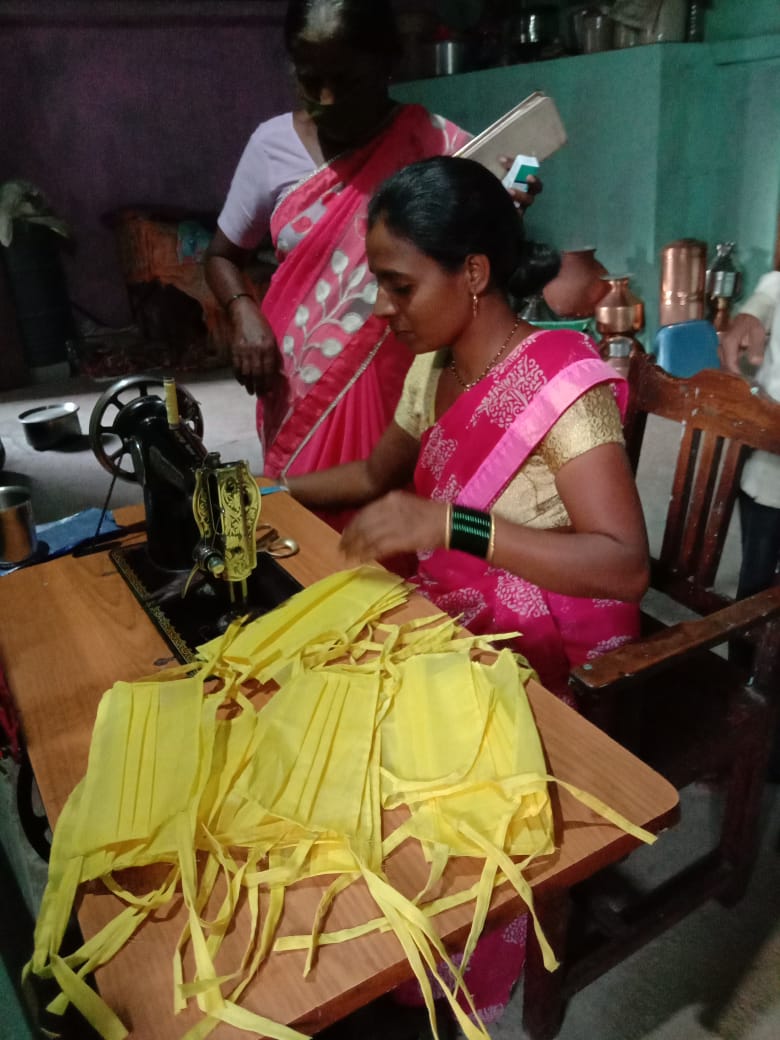USPG supporting global partners through the Covid-19 pandemic

Above: a volunteer from the Church of North India sews face masks.
It’s impossible to imagine any community in the world that hasn’t been impacted in some way by the global Covid-19 pandemic. We grapple with rising infection rates and daily changes in advice in the UK, and it could be easy to forget that for some of our brothers and sisters around the world, Covid-19 presents yet another threat to an already challenging way of life.
All around the world, USPG’s partners have risen to the challenges posed by the Covid-19 pandemic, and some have sought support from USPG in order to better support their communities. Often utilising funds raised through our Focus on the Future campaign, USPG has sought to offer additional support to partners who have requested this. We thank those who felt able to contribute to this fund which has enabled this extension of love and support, and share some recent examples of this here.
AFRICA
In Tanzania, USPG’s support has enabled the Anglican Church of Tanzania to provide training, hygiene and infection prevention equipment to community members and healthcare workers in seven mission hospitals. It will mitigate exposure to Covid-19 through hand washing stations and sanitisers for community members, training for healthcare workers, and the distribution of educational materials and personal protective equipment for healthcare workers.
In Malawi, our support has enabled five mission referral hospitals operated by the Anglican Church in Malawi (ACM) to increase their capacity to respond to Covid-19. The ACM has purchased and delivered personal protective equipment (PPE) and other medical supplies to frontline healthcare workers to help prevent the spread of the virus. The PPE includes gowns, aprons, face masks, goggles and biohazard bags.
In Madagascar, USPG is supporting the Dioceses of Toliara, Toamasina and Antsiranana - the dioceses that cover the parts of Madagascar that have been the most severely affected by Covid-19. With our support, the church has purchased masks and facilitated Covid-19 prevention education for 1,000 people from 10 communities. Amongst other things, USPG’s support has helped to provide rice and dry beans for 100 vulnerable families, and support to teachers in Anglican church schools.
Through USPG, the Diocese of Chichester is supporting the Dioceses of Freetown and Bo in Sierra Leone to help prevent the further spread of Covid-19. This support has provided food for church members who have lost jobs and are struggling to meet their daily needs. It has enabled the church to raise the public’s awareness of the dangers posed by Covid-19 via electronic and print media, and it has also helped provide thermometers, soap, disinfectants and ‘Veronica buckets’ (a bucket with a tap attached to it, which can be used as a portable handwashing station).
In Mozambique, the Diocese of Niassa carried out a campaign of education and awareness-raising aimed at preventing the spread of Covid-19, with help from USPG’s Focus on the Future Fund. Working in partnership with the country’s ministry of health, members of the diocese’s Health Technical Team went from door to door across the towns of Cobue, Lunho, Meluluca and Maniamba, teaching people basic hygiene and practical ways to curb the spread of the virus, such as hand washing, social distancing and the correct use of face masks.
ASIA
In The Philippines, we are supporting the Iglesia Filipina Independiente (IFI), whose Abundant Life Programme (ALP) seeks to empower its congregations to respond to the issues indigenous people face. The IFI’s Covid-19 response includes support for food, health and hygiene material and awareness material. All this is going on alongside the IFI’s ongoing mission to the indigenous Lumad communities, which includes education, skills training and advocacy for human rights.
In Sri Lanka, USPG is supporting the Mission Department of the Diocese of Colombo, especially in its ongoing mission to tea plantation workers via its Plantation Community Development Programme. The programme’s response includes raising awareness of health and hygiene, distribution of hand sanitisers, and educating communities on the importance of social distancing. Meanwhile, in the Diocese of Kurunagala, USPG’s Focus on the Future Fund is helping the church to provide food for some of the hardest hit families within the Diocese. In its first round of distributions, 233 families received food packages.
In India, the Church of North India (CNI) Durgapur Diocese is continuing its response to communities adversely affected by lockdown within West Bengal. USPG has agreed to support a reallocation of programme funds towards the CNI’s Covid-19 response from the 2020 budget for the CNI’s Anti-Human Trafficking programme. The response includes providing food for vulnerable families, masks, soaps and raising awareness on hygiene.
Meanwhile, the Church of South India is continuing its response to Covid-19 through various dioceses. Young people have delivered food and essential items to their elderly and vulnerable neighbours. Church-run schools, colleges, hostels and seminaries have made their premises available as places of refuge for migrant workers or people in need. Mission hospitals and clinics are leading the way in treating those who are sick. In the Vellore Diocese, the congregation of St. John’s Church donated money to Scudder Memorial Hospital in Ranipet, towards its work treating Covid-19 patients. In Kollam Kottarakara Diocese, Bishop Oommen George distributed food packages, soap and other hygiene products to local families. In the Diocese of Malabar, the Men’s Fellowship of the CSI Cathedral distributed oranges and bottled water to police officers in Calicut City.
THE CARIBBEAN
In Jamaica, the Diocese of Jamaica and the Cayman Islands prepared and distributed emergency food packages to elderly and homebound people across Jamaica, with help from USPG’s Focus on the Future Fund. Initially the diocese’s target was to distribute 500 packages, but demand was so high, that number quickly rose to 680.
